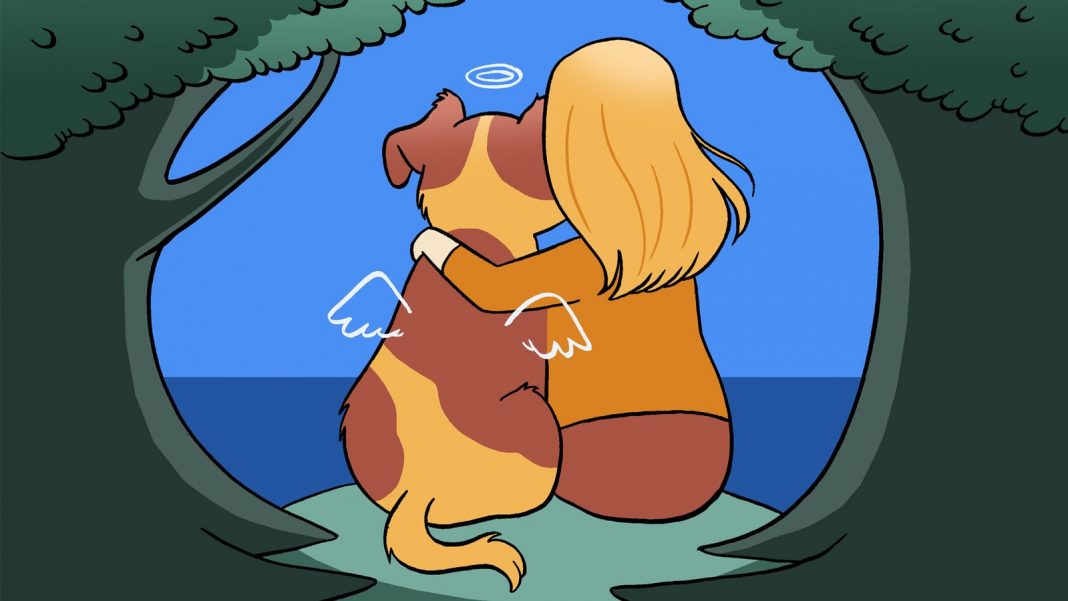When Patricia Noble had to make the decision to end her dog’s life just hours after he fell ill, the grief was almost unbearable.
“When my dad died, I grieved for him, but he wasn’t in my life regularly,” she says. “Dougie felt like a support dog… it was like my world had crashed.”
Dougie, a 10-year-old miniature dachshund, seized up while on a walk near their home in Aberdeenshire on New Year’s Day 2020. “He was paralysed – alive and running one minute, by the end of the day he wasn’t there.”

Blue Cross volunteer Patricia Noble lost her dog Dougie in 2020
The little dog had been a source of comfort for Patricia, who has struggled with depression throughout her life. After his death, she found herself in a “dark place, thinking, is it worth it? Would I have gone down that line?” she reflects. “Who knows?”
Searching for help, she came across a pet loss support service. Too emotional to speak on the phone, she got in touch and was soon exchanging regular emails with the same volunteer at the service run by Blue Cross, an animal welfare charity, over nine months. “It gave me a sense that I’m not the only one in the world that suffers this,” she says. “I felt I was being given my life back.”
Almost four years on, Patricia is now able to speak with a smile, her eyes twinkling, as she remembers Dougie, recalling how he was “utterly untrainable” but “a real sweetheart”.
“Boy, did he love barking – at the postie, visitors, for treats, especially if he was being ignored. But he was very loving. If I felt low he would jump against my legs, a signal to say, ‘lift me up – you need a cuddle!'”
She will always miss him. Grateful for the help she received, the 58-year-old is now one of 300 volunteers with Blue Cross’s pet loss support service, who offer “a listening ear”, pointing in the direction of counselling or other services if needed.
Pet loss and disenfranchised grief
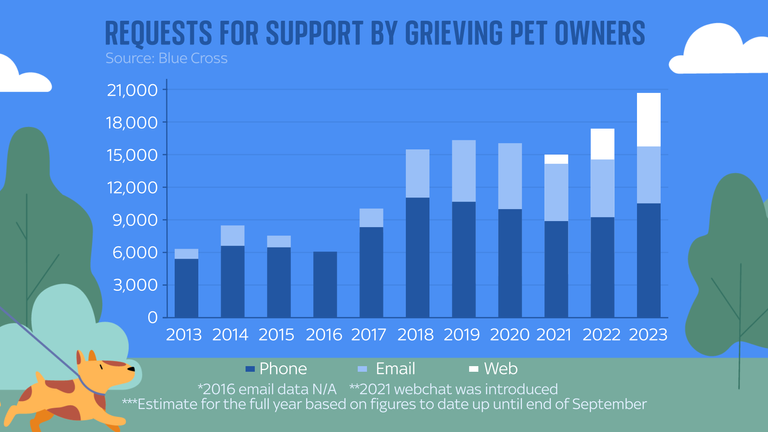
Blue Cross figures for the number of people using their support services
In the last 10 years, the number of people getting in touch has almost trebled, from 6,240 in 2013 to 17,367 in 2022. The figures so far for 2023 are currently 22% up on last year, while a private Facebook group set up by the charity in 2022, one of many such support groups on the site, now has more than 16,000 members.
But it’s a kind of grief that society doesn’t always understand. According to psychologists, pet owners can feel embarrassed when talking about the emotional impact the death of an animal has had on them, making it tricky to process their grief.
“People’s understanding in the past 10 years has grown but disenfranchised grief – where other people don’t understand – is still something we see a lot,” says Diane James, the head of pet bereavement support services at Blue Cross.
Dr Katie Lawlor, a pet loss psychologist based in San Francisco, California, was training to be a clinical psychologist before she realised there was very little, if any, support networks for those suffering due to the loss of a pet. After moving into the field and later setting up an Instagram account in March 2020, she now has almost 75,000 followers.
“For those who don’t have animals or don’t have that bond, they say, ‘oh, it’s just a dog, go get another one’,” she says. “But you would never tell somebody who’d lost a parent, ‘oh just go get a new dad’. For some of us, that bond is just as rich and as deep.”
‘My heart is absolutely broken’
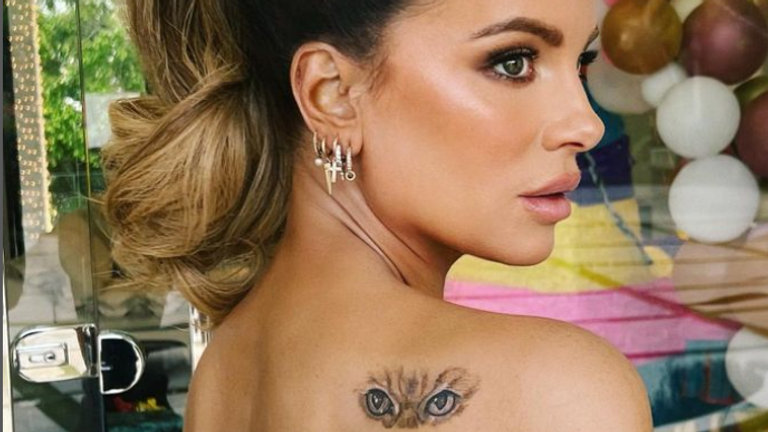
‘How can a light that burned so brightly, suddenly burn so pale’: Kate Beckinsale commemorated her cat, Clive, with this tattoo. Photo courtesy of Kate Beckinsale
Search for #petloss on Instagram and hundreds of thousands of posts pop up, while on TikTok the top videos have millions of views. A growing number of influencers and celebrities including Miley Cyrus, Seth Rogen and Kate Beckinsale have also shared their stories of loss online – as well as tattoos dedicated to their late pets.
“Every single part of my house feels like he should be in it,” Beckinsale wrote on Instagram as she announced Clive’s death in June. “My heart is absolutely and totally broken.”
Broadcaster and author Dawn O’Porter, who tackles the subject of navigating grief for an animal in her latest best-selling novel, Cat Lady, posted a poignant tribute following the death of her dog Potato at the beginning of 2022, telling followers how he was the ring-bearer at her wedding and there when she gave birth. “It was one of the great joys of my life to be his mum,” she wrote.
And there are many pet owners, like Patricia, who admit losing their animals has affected them as much if not more than the deaths of some relatives.
This content is provided by Instagram, which may be using cookies and other technologies.
To show you this content, we need your permission to use cookies.
You can use the buttons below to amend your preferences to enable Instagram cookies or to allow those cookies just once.
You can change your settings at any time via the Privacy Options.
Unfortunately we have been unable to verify if you have consented to Instagram cookies.
To view this content you can use the button below to allow Instagram cookies for this session only.
‘Everyone knew what he meant to me’
Leanne Freeman, 33, from Dartford, lost her house rabbit, Thumper, unexpectedly in February. When she realised he was dying, she cuddled him and tried to make sure he was as comfortable as possible. “I wanted to give him his favourite food so I ordered parsley on Deliveroo. I didn’t want to leave him.”
Thumper, a Netherland dwarf rabbit, who was almost five, had been with Leanne since he was eight weeks old. She says his death felt like losing a limb.
“It was a good 48 hours before I stopped randomly crying.” she says. “He was free to roam around the flat… if I went for a shower, he’d come and sit in the bathroom with me. He was happy to be carried over my shoulder like a baby and I would take him to my parents’ – we’d joke that it was ‘nanny and granddad’s house’.”
Luckily, colleagues at work were supportive after his death. “Some people have pictures of their kids on their desks, I had a picture of my rabbit. Everyone knew what he meant to me.”
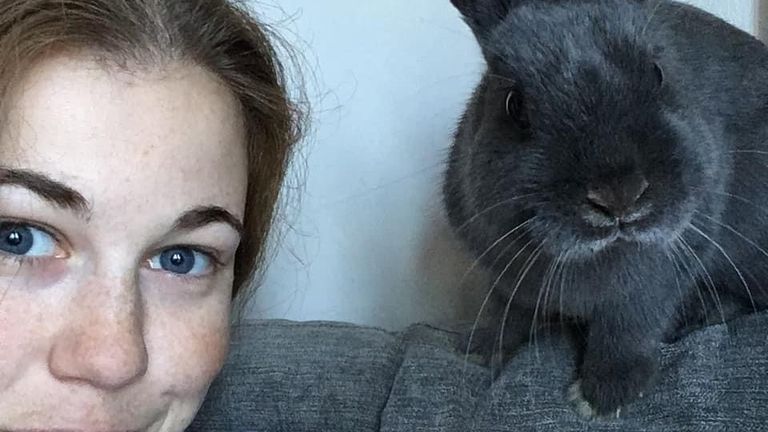
Leanne Freeman’s house rabbit Thumper died earlier in 2023. She had him cremated at the Cherry Tree Pet Crematorium in Kent, and also kept a cutting of his fur (pictured below)
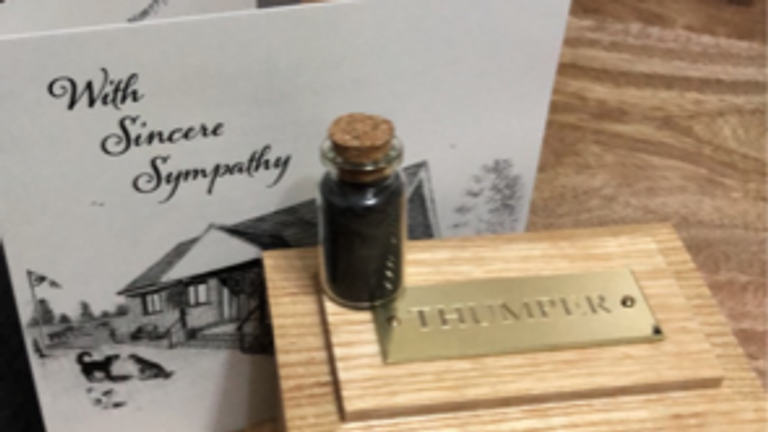
One feeling that comes from the specific grief of losing a pet is the question of whether they understand how much they mean to you. Brad Webber, 35, and his partner Natalie lost their beloved chow chow, Kia, and have experienced this feeling. “You can tell a grandparent you’re going to miss them but animals… you can cuddle them and say comforting things but you can’t be satisfied that they know how much you care,” he says. “That’s hard.”
The couple now have two spaniels, and Brad says he sees parallels between the love he has for his pets and his toddler son.
“You see them grow and share first experiences,” he says. “You’re there when they’re scared, when they’re hurt and you build a mutual understanding. You recognise each other’s likes, dislikes and emotional qualities.”
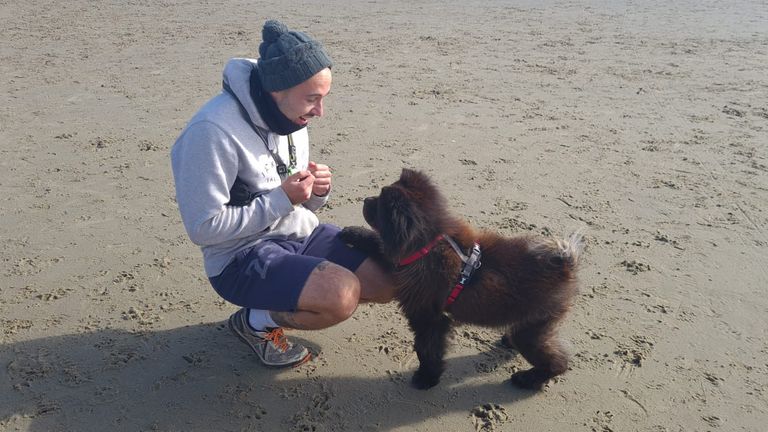
Brad Webber and his partner Natalie lost their chow chow Kia in 2021
Leanne and Brad are among many pet owners living in and around Kent who sought support from Cherry Tree Pet Crematorium, which offers keepsakes such as pawprints, jewellery and hair cuttings, as well as cremation services and euthanasia.
Another is Chloe Harding, 37, from Rochester, whose horses and dogs helped her deal with anxiety throughout her life, following the death of her father in a car accident when she was seven.
Just before the COVID lockdown in 2020, Chloe lost her three-year-old German shepherd, Maverick. Ten days later, her pony, Harry, also died suddenly; this all came in a period in which she had also lost her job.
“It was really tough because the next morning, you don’t have a horse to look after, a dog to walk… everything that I defined myself by had been stripped away.”
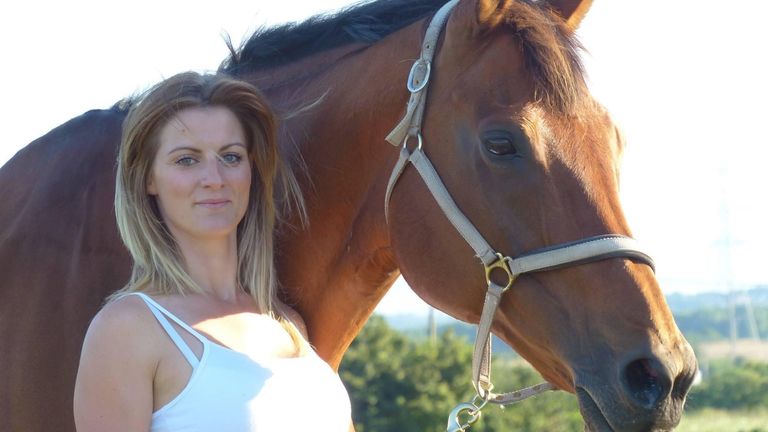
Chloe Harding and her horse, Annie, and below with her husband and dog, Maverick
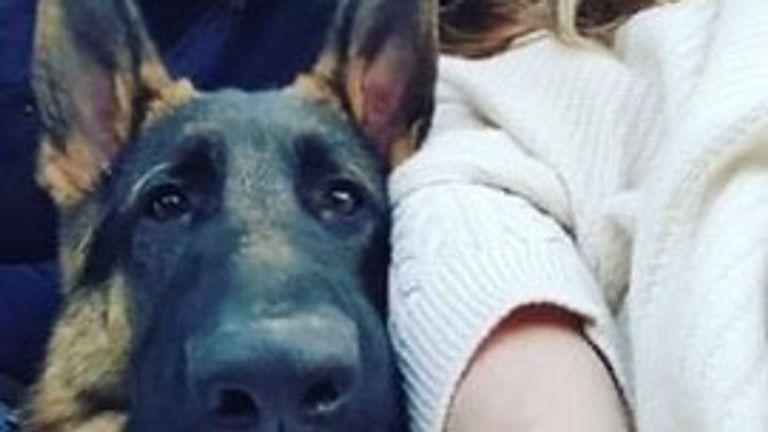
‘I told my boss I’d lost a family member when my rabbit died’
Dr Lawlor cites statistics from studies on pet bereavement: 85% of pet guardians report loss and grief symptoms comparable to loss of family members, and a third of pet guardians have continued to grieve at six months, and almost a quarter still after a year.
When her rabbit Gem died in 2000, she requested time off work. “I wrote to my boss, who was not an animal person, and told her I’d lost a family member. For me, that’s true, and I stand by it. But I think there’s such a stigma around mourning an animal, sadly, that continues.”
Now, she posts on social media several times a week, sharing her own advice or kind words from others. “I was getting messages [when I started] saying, ‘thank you for normalising this’,” she says. “For so many of us, our primary and our preferred sources of love do come from animals.”
For many pet owners, the hardest part is making the decision to say goodbye. Dr Lawlor says she is asked most about euthanasia and guilt; according to a Royal Veterinary College (RVC) study published in 2021, looking into the deaths of 29,163 dogs in the UK over a one-year period, the vast majority – 26,676 (91.5%) – involved euthanasia, while just 2,487 (8.5%) were unassisted.
‘We know we’ll have to say goodbye – but we still do it’
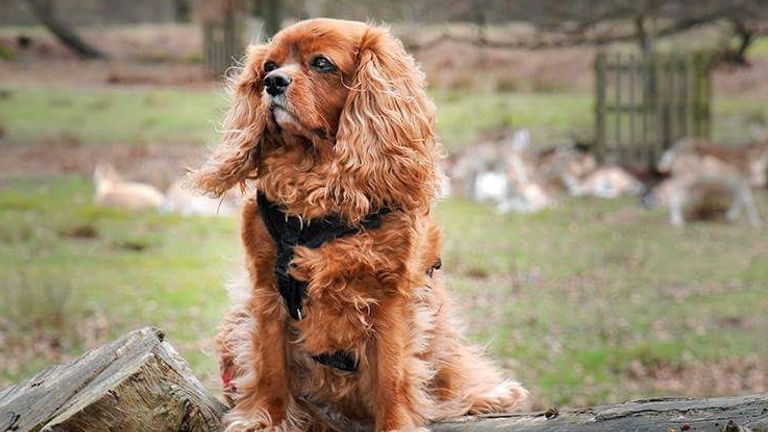
Karen Barnard’s dog Ruby lived until she was 15
Karen Barnard, who has 17 pets, including three dogs currently, and offers boarding for guinea pigs and other small animals at her home near Tunbridge, made the difficult decision to put her dog Ruby down at the age of 15. The King Charles cavalier spaniel’s kidneys had starting failing, and Karen didn’t want her to suffer.
She made sure Ruby was comfortable on her last day. “She had a whole box of Maltesers. And then she went to sleep with my other little dog by her side… I feel a lot of peace at being able to give her the goodbye she deserved.”
Animal bereavement specialist and author Angela Garner, who works with the Ease animal charity in the UK, agrees the emotions that come with this decision should not be underestimated. “It’s a big thing for people to cope with, to make that decision – to prevent unnecessary suffering and make the end of life as easy as possible for an animal who has become integral in their lives, part of the family. Finding the right time to actually say goodbye.”
Angela says the issue of pet grief is becoming more recognised, thanks to wider awareness about mental health over the past few years, but there is still work to be done.
“There’s such a highlight now in terms of mental health in this country that it is bound to create more awareness of what people have been suffering, probably silently,” she says. “We take our pets on knowing we are going to have to say goodbye at some point. But we still do it, because we care.”
For Patricia, volunteering has helped her get through the “dark tunnel of pet loss”. In the two-and-a-half years since she started, she has been there for almost 500 conversations over the phone or on webchat.
“It almost feels like a calling now. It means a lot to people to know we understand. It hurts. And every grief experience is valid.”


